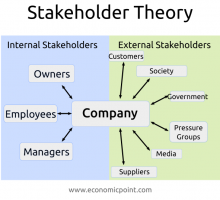Planning is an administrative process that consists in analyzing different strategies and courses of action, taking into account the present and future organizational environment.
The business planning process defines:
- Vision: A description of the company in the future, what needs it satisfies, its position in the market and in which it wants to convert the company. It focuses on the future.
- Mission: What the company is doing at this moment to achieve its objectives. It focus is on the present.
- Policies: Roles and responsibilities of the different administrative levels. They define what decisions can be made by each levels. The policies, within the planning process, include rules, procedures, and guides. They allow middle managers to execute actions and take decisions without having to consult higher levels.
- Strategies: They take the competition and the environment into account.
- Goals: Objectives that outline expected outcomes.
A goal without a plan is just a wish Antoine de Saint-Exupéry
Strategic Planning
Strategic planning is a management activity and a process that defines the direction and the objective of a business over the long term. It defines how resources should be allocated.
Strategies, as elements of planning, define what business the company should be in the long term and how to allocate the resources to achieve the vision. The strategy takes into account the competitors and the environment.
Strategic planning is a subprocess of planning that focuses on the creation of a strategic plan. The strategic plan is a document that shows concrete actions and measures that must be carried out to achieve the vision and mission.
Strategic planning is a creative activity that takes into account the information and opinion of every area of the company and also the environment. Clients, suppliers and market specialists can help in developing the strategic plan. Possible technological changes, regulations and the competition should be taken into account.
Strategic planning takes elements of several disciplines: industrial analysis, game theory, macro and microeconomic analysis, etc.
Operational Planning
Operational Planning focuses on the short term. It assumes the objectives and goals are already established and defines short term measures to achieve them. Operational planning refers to a period of time of one year or less.
Planning as an Element of the Administrative Process
Planning is not executed only once but is a process that receives feedback from control or evaluation. The plans can be revised because of changes in the environment or because the past estimation of the present diverts from the current situation.
It is of importance that companies are able to adjust to the accelerated technological shifts. A company that delays or fails to adjust its plans to the changing environment may disappear because the needs it satisfies can be better met by other companies or because the needs and preferences of the customer base have changed.
For this reason, short-term plans (one year, for example) must be much more detailed than long-term plans (five years, for example).
There are companies that operate in a relatively stable environment (a water processing plant, for example) and companies that operate in a fast changing environment, like software development companies.
Planning Feedback
All human plans [are] subject to ruthless revision by Nature, or Fate, or whatever one preferred to call the powers behind the Universe. Arthur C. Clarke, 2010
Planning and strategies should be improved as the company acquires more experience and information and as the environment changes. The flow of information between different areas must be fluid. The information must flow horizontally and vertically.
A common mistake in many organizations is to overestimate their ability to view the environment. Many managers maintain the same strategy even though technological shifts or consumer preferences changes have already occurred. Changing plans too late can mean market and profit loss.
Benefits of Business Planning
When you fail to prepare, you are preparing to fail. Benjamin Franklin
Planning allows resource allocation efficiency and focusing efforts on those activities that are key to the organizational future.




